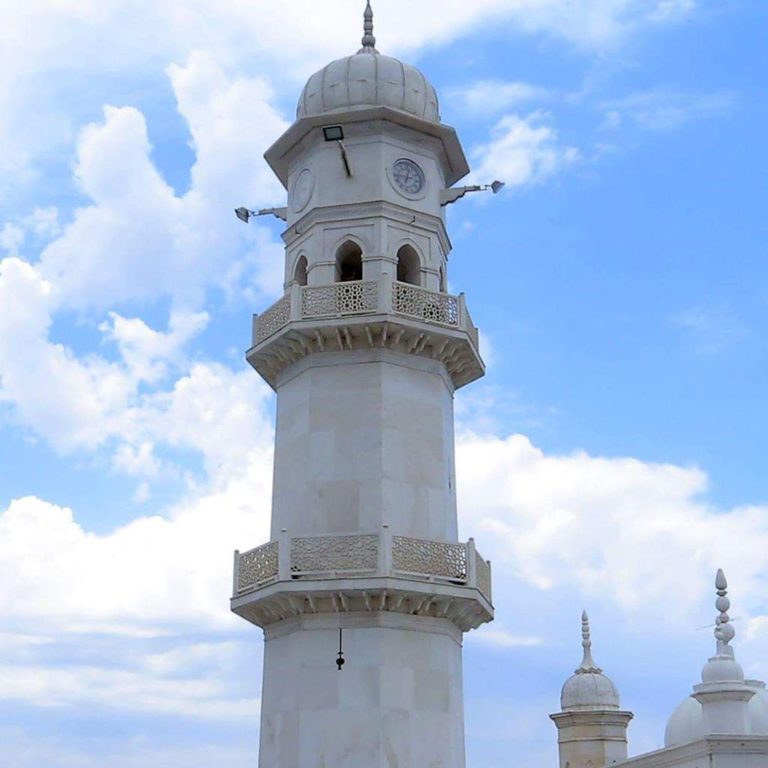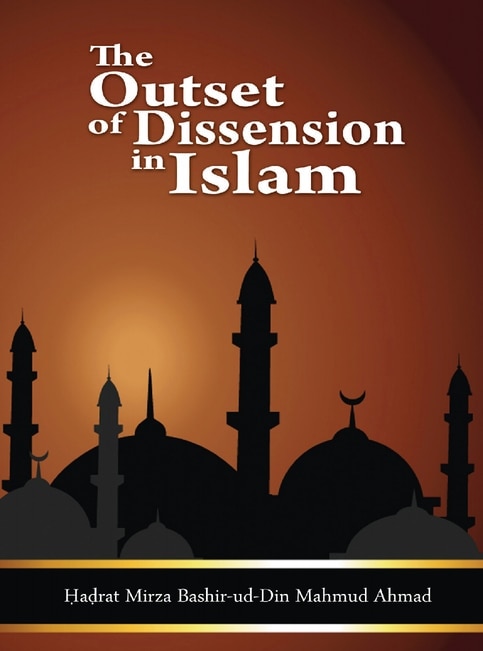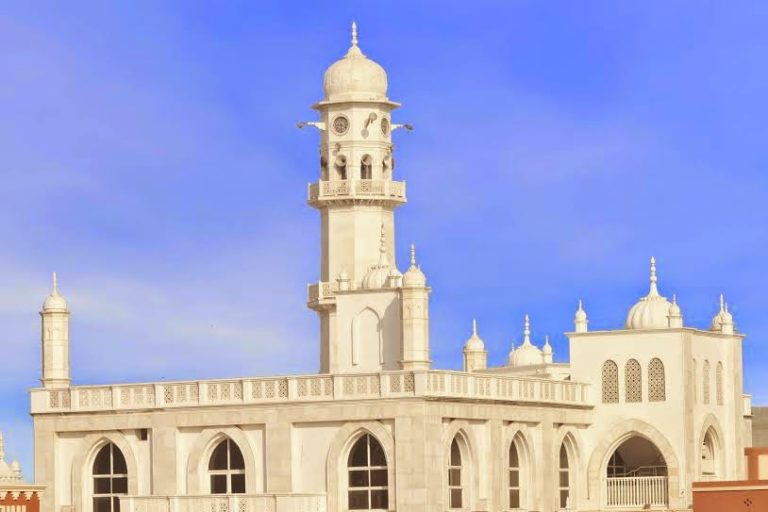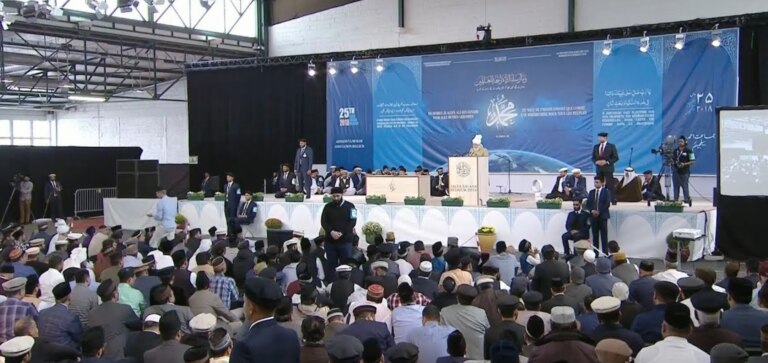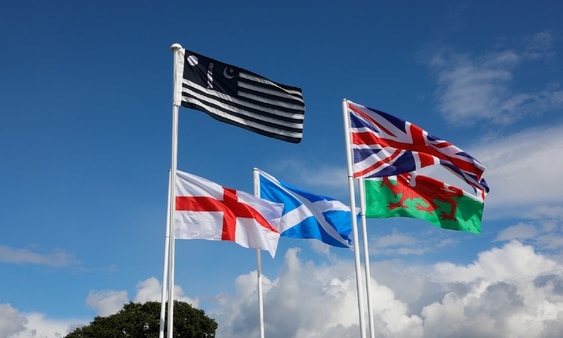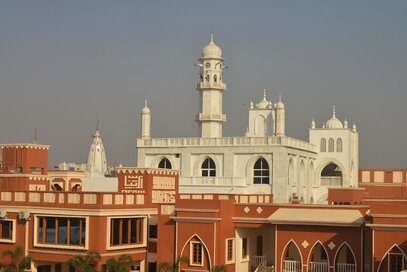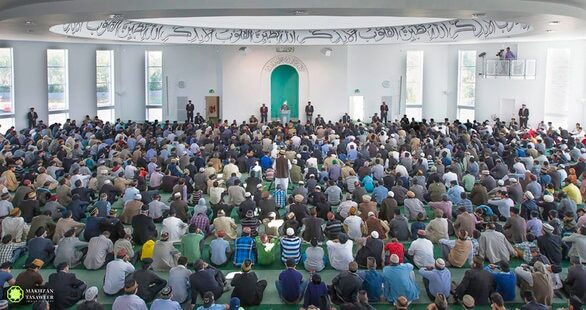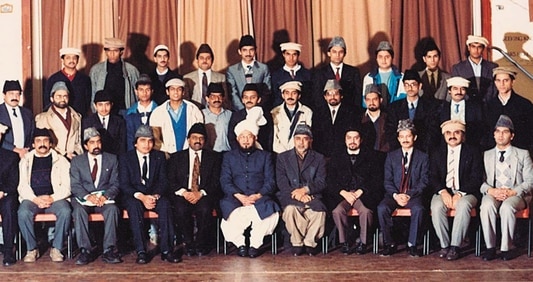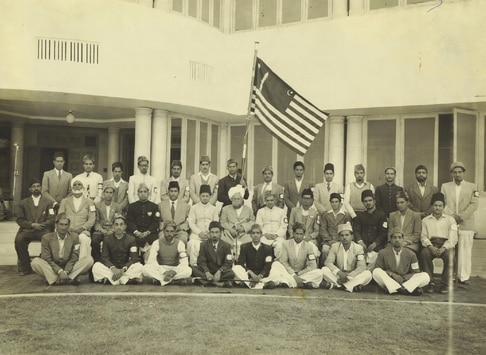Friday Sermon
24 August 2018
Men of Excellence
After reciting the Tashahud, Ta‘awuz, and Surah Al-Fatihah, Hazrat Khalifatul Masih Vaa stated:
Hazrat Asimra bin Thabit was a companion of the Holy Prophetsa. His father was Thabit bin Qais and his mother’s name was Shamoos bint Abu Aamir. The Holy Prophetsa established a bond of brotherhood between him and Abdullah bin Jahash. At the Battle of Uhud, when the disbelievers of Mecca launched a sudden attack, which caused a panic amongst the Muslims, Hazrat Asimra remained steadfast in his position next to the Holy Prophetsa. He pledged allegiance to the Holy Prophetsa that he would be willing to offer his life for him. He was among the archers appointed by the Holy Prophetsa. (Al-Tabkaat-ul-Qubra Li-ibn Sa‘d, Pt. 3, p. 243, Asim bin Thabit, Maktaba Dar-ul-Fikr, Beirut, Lebanon, 1996)
He belonged to the Aus tribe and took part in the Battle of Badr. (Usdul Ghaba Fi Marifati Al-Sahaba, Vol. 3, p. 5, Asim bin Thabit, Maktaba Dar-ul-Fikr, Beirut, Lebanon, 2003)
On the day of the Battle of Badr, the Holy Prophetsa asked the Companions as to how they would fight when confronted by the enemy. Hazrat Asimra replied, “O Messenger of Allahsa, when they are in range of our arrows, we will use our arrows. When they come close enough that our stones can reach them, we will use stones.” He then lifted three stones in one hand and placed two in the other hand. He then stated, “When they come close enough to attack with our spears, we will fight them with spears. When our spears break, we will fight them with our swords.”
Upon this, the Holy Prophetsa said, “Indeed, this is the correct way to fight in a battle.” He further said, “Whoever wishes to fight should fight according to the way Asim has described.” (Al-Mujam Al-Kabir, Hafiz Abu Qasim Sulaiman Ahmad Tibrani, Vol. 5, p. 34, Rifa‘a bin Al-Munzir…Dar-ul-Hayaa, Al-Turath Al-Arabi, 2002)
During those times, wars were only fought with swords and spears, and this was the only method of war. Stones were also used. It was not like nowadays where they kill even innocent people and children by shelling at them. A non-Muslim wrote a book in which he mentions the wars fought by the Holy Prophetsa and said, “Allegations are levelled against Muhammad as to why he fought wars. A few hundred or a thousand people may have died during the battles he fought, but those who consider themselves ‘progressive’ and ‘advocates for humanity’ killed more than 70 million people, the majority of whom were ordinary citizens.”
He was referring to the Second World War. However, today, regrettably, Muslims are seeking help from those same people and Muslims are killing fellow Muslims without any distinction. Instead of employing the method [of the Holy Prophetsa] wherein in he only attacked in response to the enemy’s attack and even then the various means adopted to attack were only once it came close, however these people are initiating the attack themselves and killing innocent people.
It is mentioned in another narration that Hazrat Alira returned with his sword on the day of the Battle of Uhud and it had become bent due to intense fighting. Hazrat Alira said to Hazrat Fatimara, “Keep this commendable sword. It will prove useful in the battlefield.” The Messenger of Allahsa heard what he had said. Thus, he said, “If you have shown excellence with the sword today, then Sahl bin Hunaif, Abu Dujanah, Asim bin Thabit and Haris bin Sama have also shown excellent swordsmanship.” (Al-Mustadrak Ala Al-Sahihain, Hafiz Abu Abdullah Muhammad bin Abdullah, Kitaab-ul-Maghaazi Wa Al-Sair, Vol. 5, p. 1623, Hadith no. 4309, Maktaba Nazaar Mustafa Al-Baaz, Mecca, Riyadh, 2000)
In a narration it is mentioned that the Holy Prophetsa conferred a favour upon one of the prisoners of Badr, Abu Azza Amr bin Abdullah – a poet – by setting him free. The reason for this was that he said, “O Muhammad, I have five daughters and I am their only guardian. Hence, please set me free for them as an act of charity.” Subsequently, the Holy Prophetsa set him free. Upon this, Abu Azza said, “I make a solemn pledge to you that I will never fight you in the future, nor will I assist anyone in their wars against you”. Hearing this, the Holy Prophetsa sent him back and freed him without receiving anything in return.
When the Quraish were about to leave for Uhud, Safwan bin Umayyah went to him and urged him to go with them. He replied, “I have made a firm pledge with Muhammad that I will never fight him and neither will I assist in any wars against him. He had conferred this favour upon me and upon no one else.” Hearing this, Safwan gave him a guarantee that if he was to be killed, he [Safwan] would adopt his daughters and if he was to survive, he would give him a mountain of wealth, which would only be for his family. (In other words, Safwan was enticing him to join them in the battle by saying that if he was to be killed, he would treat his daughters like his own, but if he survived he would be given an abundance of wealth). Upon this, Abu Azza started to gather other Arab tribes and incite them for war. (He not only participated himself, rather, he went to gather other people from other tribes in order to fight the Muslims). He then left for the Battle of Uhud alongside the Quraish and was once again imprisoned during the war. No one else from among the Quraish was imprisoned alongside him. Hence, when he was captured, he was asked about the oath he made. He replied, “O Muhammadsa! I was compelled to fight as I have daughters to look after. Please be kind towards me.” (He repeated the same excuse saying that he had to look after his daughters and for the Holy Prophetsa to show him kindness. The Holy Prophetsa had shown compassion to him previously and he was set free. However, he came out to fight again). Upon this, the Holy Prophetsa said, “What about the pledge that you made with me? Absolutely not!” This cannot be allowed. “By God! You will not be permitted to roam around Mecca saying that you”, God forbid, “deceived and fooled Muhammad twice.”
According to another narration, the Holy Prophetsa said that certainly, a believer cannot be bitten twice from the same hole. He then commanded Asimra bin Thabit to kill him. Asimra stepped forward and beheaded him. (Kitab-ul-Maghaazi, Abu Abdullah Muhammad bin Umar, Vol. 1, pp. 110-111, Badr-ul-Qitaal, Dar-ul-Kutub Al-Ilmiyyah, Beirut, Lebanon, 2004)
Thus, these people were handed out punishments after having committed such injustices and breaking their pledges, but yet, people criticise the character of the Holy Prophetsa saying that he was guilty of cruelties, God forbid. These days [Geert] Wilders, a politician in Holland, is exceeding all bounds in attacking the character of the Holy Prophetsa. If he can show examples of the aforementioned forgiveness in this world, or even in his own country, then his allegations can be justified to a certain extent. However, he will never be able to show such examples.
Hazrat Mirza Bashir Ahmad Sahibra has mentioned the incident of Raji and Hazrat Asimra in Sirat Khatam-un-Nabiyyeen [The Life and Character of the Seal of Prophetssa]. He writes, “In the month of Safar 4 AH, the Holy Prophetsa assembled a party of ten Companions, and appointed Asim bin Thabitra as their Amir [leader] and ordered them to secretly go towards Mecca and obtain intelligence with regards to the Quraish, and then inform him about their plans and motives. However, this party had not yet departed, when a few people from the tribes of Adal and Qarah presented themselves before the Holy Prophetsa, and said that many people from among their tribes were inclined towards Islam and that the Holy Prophetsa should send a few men with them, who could convert them to Islam and educate them. The Holy Prophetsa was pleased to hear their request and the same party which had been assembled for the reconnaissance mission was sent off with them instead. However, in actuality, as was later discovered, these people were liars and had come to Medina upon the incitement of the Banu Lahyan, who sought revenge for the execution of their chief, Sufyan bin Khalid, and had thus contrived the plan that when the Muslims come out of Medina on this pretence, they would attack them. In lieu of this service, the Banu Lahyan promised the people of Adal and Qarah a hefty reward of many camels. When the treacherous people of Adal and Qarah reached between Asfan and Mecca, they secretly sent a message to the Banu Lahyan that the Muslims were accompanying them and that they should come as well (in order to kill them). Upon this, 200 young men from the Banu Lahyan, 100 of whom were archers, set forth in pursuit of the Muslims, and subdued them at a place known as Raji. But how could 10 Muslims compete against 200 warriors? The Muslims, however, had not been taught to throw in their arms. The Companions immediately ascended to a nearby hillock and prepared for battle. The disbelievers, who did not consider deception as being reprehensible, called out to them and said, ‘Come down from the mountain, we give you a firm promise that we shall not kill you.’ Asimra responded, ‘We have no confidence whatsoever in your treaties and agreements. We cannot descend on your guarantee.’ Then, he raised his head towards the heaven and said, ‘O God! You are witnessing our state. Do convey knowledge of our condition to Your Messenger.’ Hence, Asimra and his companions stood and fought and were eventually martyred in battle.” (Sirat Khatam-ul-Nabiyyeen, Hazrat Mirza Bashir Ahmadra, pp. 513-514)
He further writes, “In the context of this very incident of Raji, a narration has been related that when the Quraish received news that Asim bin Thabitra was also among those who had been martyred at Raji at the hands of the Banu Lahyan, since Asimra had slain a principal chieftain of the Quraish, they especially sent some men towards Raji, and emphatically instructed them to return with the head of Asimra or another part of his body, so that they could be put to rest and their thirst for revenge could be quenched. In another narration it is also mentioned that the mother of the person who was killed by Asim, Sulafa bint Sa‘d, had vowed that she would drink wine from the skull of the person who killed her son. However, the power of God was such that when these people arrived there, lo and behold, they found swarms of hornets and male honey bees resting upon the body of Asimra and they just would not move at all. These people tried their level best to send off these hornets and bees, but no attempt proved successful. Finally, with no other choice, they returned frustrated and unsuccessful. Soon after, a storm of rain came and took the body of Asimra elsewhere. It is written that upon accepting Islam, Asimra vowed that he would completely abstain from anything that was polytheistic, to the extent that he would not even touch an idolater. When Hazrat Umarra was informed of his martyrdom and of this occurrence in particular, he said, ‘Look how beautifully Allah guards the emotions of his beloved servants. He fulfilled the vow of Asimra even after his demise and safeguarded him from the touch of idolaters.’” (Seerat Khatam-ul-Nabiyyeen, Hazrat Mirza Bashir Ahmadra, p. 516)
Hazrat Asimra is also known as Hami-ud-Dabar i.e. the person who was saved by wasps or bees. Even after his death, God Almighty protected him through the wasps. Following the martyrdom of Hazrat Asim and his companions, the Holy Prophetsa offered the prayer of Qunut during the Fajr prayer for an entire month, in which he cursed the tribes of Rihl, Zakwan and Banu Lahyan. (Usdul Ghaba Fi Marifati Al-Sahaba, Vol. 3, p. 6, Maktaba Dar-ul-ilmiyyah, Beirut, Lebanon, 2008)
In another tradition it is narrated that Hazrat Asimra would fire arrows towards the enemy and would repeat the following couplet:
اَلْمَوْتُ حَقٌّ وَالْحَيٰوةُ بَاطِلُ
وَكُلُّ مَا قَضَي الْاِلٰهُ نَازِلُ
بِالْمَرْئِ وَالْمَرْئُ اِلَيْهِ اٰيِلُ
That is to say that death is inevitable and the worldly endeavours are futile, and whatever God Almighty has decreed for man shall surely come to pass and man has no choice but to accept it. When Hazrat Asimra ran out of arrows, he began fighting with a spear. When that too broke, he took out his sword and lost his life in battle. (Al-Sira Al-Halbiyyah, Allama Abu Farj Nuruddin Ali bin Ibrahim, Vol. 3, p. 234, Sirya Raji, Dar-ul-Kutub Al-Ilmiyyah, Beirut, Lebanon, 2002)
The second companion I will mention is Hazrat Sahlra bin Hunaif Ansari. Hunaif was the name of his father and the name of his mother was Hind bint Rafi. He had two brothers from his mother’s side, Abdullah and Nauman and his children were, Asad, Uthman and Sa‘d. The children remained in Medina and Baghdad. The Holy Prophetsa formed a bond of brotherhood between him and Hazrat Alira. He accompanied the Holy Prophetsa in all battles including the Battle of Badr. Hazrat Sahlra bin Hunaif had a lofty status, but did not have a strong financial position. Hazrat Abu Uyainah relates that he heard Zuhri say that from the war booty of Banu Nazir the Holy Prophetsa gave nothing to any Ansar Companion except Hazrat Sahlra bin Hunaif and Hazrat Abu Dajana as they both were in need of financial support. (Al-Tabkaat-ul-Qubra Li-ibn Sa‘d, Vol. 3, p. 247, Dar-ul-Hiyaa Al-Turath Al-Arabi, Beirut, Lebanon, 1996). (Al-Isti‘aab Fi Marfiti Al-Sahaba, Vol. 2, p. 223, Dar-ul-Kutub Al-Ilmiyyah, Beirut, 2002)
Ibn Ishaaq states that after the migration of the Holy Prophet to Medina, Hazrat Alira remained in Mecca for three days and nights. He returned all the possessions to those people who had given them to the Holy Prophetsa to look after. Following this he came and joined the Holy Prophetsa and stayed in the house of Qulthum bin Hidam. During the journey, Hazrat Alira remained in Quba for a few nights. He [Hazrat Alira] states “In Quba there was a Muslim woman who was unmarried. I saw that each night a man would come to her house and knock on her door. Upon this the woman would come out and the man would give her something and she would take it.” He states “I became suspicious regarding this and said to her, ‘O virtuous woman! Who is the person who comes and knocks on your door every night; when you attend to the door he gives you something, about which I have no knowledge. You are a Muslim woman who does not have a husband. Therefore, coming out at night and meeting a man or taking something from him is not appropriate.’ She answered, ‘The person is Sahl bin Hunaif. He is aware that I am alone and have no one with me. Therefore, when night falls he smashes the idols of his people and brings them to me so I can burn them.’” Ibn Ishaaq states that Hazrat Alira would mention this incident of Hazrat Sahlra up until his demise of how he [i.e. Hazrat Sahlra] used this method to eradicate idolatry amongst his people. (Al-Sira Al-Nabawiyya Li ibn-e-Hisham, p. 348, Hijrat Al-Rasool, Dar-ul-Kutub Al-Ilmiyyah, Beirut, 2001)
Hazrat Sahlra bin Hunaif was amongst those great companions who remained steadfast during the Battle of Uhud and took the pledge of allegiance to offer his life at the hand of the Holy Prophetsa. He stood like a shield in front of the Holy Prophetsa at a time when the severe attack of the opponents caused the Muslims to disperse. That day, he shot arrows on behalf of the Holy Prophetsa. The Holy Prophetsa stated:
نَبِّلُوْا سَهْلًا فَاِنَّهٗ سَهْلٌ
Meaning “Give arrows to Sahl as it is easy for him to shoot arrows”. (Al-Isti‘aab Fi Marfiti Al-Sahaba, Vol. 2, p. 223, Dar-ul-Kutub Al-Ilmiyyah, Beirut, 2002)
It is narrated that there was a Jewish man by the name Ghazool, who was an expert spearman and could throw a spear further than anyone. During the siege of Banu Nazir, a tent was prepared for the Holy Prophetsa. Ghazool threw a spear that reached the tent. The position of the tent was moved under the instructions of the Holy Prophetsa. After this Hazrat Alira went in pursuit of the aforementioned individual. Meanwhile, Ghazool along with a small group were planning to kill one of the Muslim chiefs. Hazrat Alira ambushed him and killed the spearman and presented his head to the Holy Prophetsa. Those who were with him fled. The Holy Prophetsa sent an expedition of ten men under the leadership of Hazrat Alira to punish them. They followed them and killed them because they had been secretly planning to carry out an attack and other killings. Hazrat Abu Dajanara and Hazrat Sahlra bin Hunaif were amongst the group which sent under the leadership of Hazrat Alira. (Al-Sira Al-Halbiyyah, Vol. 2, p. 359, Ghazwa Banu Nazir, Dar-ul-Kutub Al-Ilmiyyah, Beirut, 1999)
In those days, there was no single day that would pass by in peace. The enemy were waiting to strike at every moment. Thus, this was the appropriate punishment for such bitter enemies.
After the victory at Khaybar, the Holy Prophet headed towards Wadi-ul-Qara. When the army of the Holy Prophetsa reached Wadi-ul-Qurra, the Jews were already prepared for war. They welcomed the Muslim army with a flurry of arrows. A servant of the Holy Prophetsa named Midam was taking off the saddle of the camel of the Holy Prophetsa when a stray arrow hit him, killing him instantly. The Holy Prophetsa immediately instructed to form rows for battle. He granted the flag to Hazrat Sa‘d bin Abadah and from the other flags gave one flag to Hazrat Khubaabra bin Munzir, the second to Hazrat Sahlra bin Hunaif and the third to Hazrat Abbad bin Bishr. In result of this expedition, the whole area came under the Muslims and God granted victory to the Muslims along with an abundance from the spoils of war.
The Holy Prophetsa remained there for four days and distributed the spoils of war amongst the Companions and left the land and orchards with the Jews. In spite of the victory, he left the land and orchards with those people, but appointed a collector. This is a prime example of the kind treatment, even with the enemy that the possession of land remained with them and some tax was gathered from it. In accordance with the customs of that time, if one forcefully took over the possessions and land, it was not deemed wrong; however, the Holy Prophetsa showed compassion towards them. (Shara Zarqani Ala Mawahib Al-Duniya, Vol. 3, pp. 301-303, Dar-ul-Kutub Al-Ilmiyyah, Beirut, 1996), (Imtia-ul-Asmaa, Vol. 1, pp. 325-326, Ghazwa Wadiye Al-Qura, Dar-ul-Kutub Al-Ilmiyyah, Beirut, 1999).
Regarding this, Hazrat Mirza Bashir Ahmad Sahibra writes in his book, Sirat Khatam-un-Nabiyyeen [The Life and Character of the Seal of Prophetssa],
“When the land of Syria was conquered and the Christian population that lived there came under the Islamic State, one day, it so happened that two companions of the Holy Prophetsa, Sahl bin Hunaifra and Qais bin Sa‘dra were sitting somewhere in the city of Qadsiyyah when a Christian funeral procession happened to pass by. Upon witnessing this, both Companions stood up in reverence. Another Muslim who had not remained in the company of the Holy Prophetsa and was unaware of the moral qualities taught by Islam, became very amazed and addressed Sahlra and Qaisra in astonishment saying, ‘This is the funeral procession of a dhimmi [a non-Muslim, living in an Islamic State] Christian.’ They responded ‘Indeed! We are aware, but the practice of the Holy Prophetsa was that he would stand up even for the funeral procession of a non-Muslim, and he would say, ‘Do they not possess a soul created by God?’” (Sirat Khatam-ul-Nabiyyeen, Hazrat Mirza Bashir Ahmadra, pp. 656-657)
Thus, this is one way of honouring humanity and ending enmity between religions and these foundations were laid by the Holy Prophetsa and later the Companions adopted the same practice.
It has been narrated from Abu Wail that they were in Siffin when Hazrat Sahlra bin Hunaif stood up and said, “O People! Consider yourself to be in error, for we were with the Holy Prophetsa at the time of Hudaibiya. If we had noticed the conditions of battle, we certainly would have engaged in it. Hazrat Umarra bin Khattab then arrived (this is during the incident of Hudaibiya) and said, ‘O Prophet of Allah! Are we not on the right path and the disbelievers in the wrong?’ The Holy Prophetsa replied, ‘Indeed!’ He then said, ‘Are those who have been martyred from among us not in paradise and theirs in the hell-fire?’ The Holy Prophetsa replied, ‘Indeed’. Hazrat Umarra then said, ‘Why shall we then be subjected to such humiliation in regards to our faith by entering this treaty on the day of Hudaibiya? Should we not return back until God settles the matter between us?’ The Holy Prophetsa said, ‘O son of Khattab! I am the messenger of God and He shall never cause me to perish.’ Hazrat Umarra then went to Hazrat Abu Bakrra and repeated to him what he said to the Holy Prophetsa. Hazrat Abu Bakrra replied, ‘He is the messenger of God, and He shall never cause him to perish.’ (Bukhari then further writes in the Hadith) It was then that Surah Al-Fath was revealed and the Holy Prophetsa recited the entire Surah to Hazrat Umarra. Hazrat Umarra then said, ‘O messenger of God! Is this the victory?’ The Holy Prophetsa replied, ‘Yes.’” (Sahih Al-Bukhari, Kitab-ul-Jizya, Baab Ithmun Man Aahada Thuma Ghadara, Hadith no. 3182)
Under the commentary of this Hadith, Hazrat Syed Waliullah Shah Sahib writes, “Siffin is a place located between Iraq and Syria where the clash between Hazrat Alira and Hazrat Muawiyara took place. When Hazrat Muawiya’s army realised they were on the verge of defeat, they held the Holy Quran high up and said that let the Holy Quran decide between them. Thus, upon the declaration of Hazrat Alira, the battle came to an end. Some people objected to the declaration for ending the battle. Hazrat Sahlra was on the side of Hazrat Alira and said to them:
اِتَّهِمُوْا اَنْفُسَكُمْ
That is, they should not consider their opinions to be correct because prior to this, Hazrat Umarra also developed a misunderstanding but as the events unfolded, they ultimately proved that the steadfastness of the Holy Prophetsa and honouring his treaty was truly blessed and he was safeguarded from the dangers. He then said that what was being considered by some to be a sign of weakness and humiliation then, in turn became a source of establishing their strength and honour. The Holy Prophetsa kept regard of every aspect of the treaty, regardless of how big or small”. (Sharah Sahih Al-Bukhari, Hazrat Syed Zain-ul-Abideen Walliullah Shah Sahib, Vol. 5, p. 543)
Although in this particular instance they were betrayed and the desired outcome was not achieved, however a believer should always think positively and one should make every effort to whatever attempt is made to form a treaty for the sake of God Almighty – to oversee all aspects of it is the true hallmark of a believer. Having said that, one should not allow themselves to be betrayed a second time. In that earlier instance [of Hudaibiyya], God Almighty had informed the Holy Prophetsa and it was in light of it that Hazrat Sahlra said that if a treaty was being made and the battle would end as a result, then they too should keep the Treaty of Hudaibiyya in mind and pursue for a treaty.
Hazrat Sahlra bin Hunaif relates, “The Holy Prophetsa said to me, ‘You are my envoy being sent to Mecca. Go to them and convey my greetings of Salam. Tell them that the Holy Prophetsa instructs them about three things: not to take oath in the name of their forefathers for that is forbidden and a sin; when they sit to relieve themselves, they should not turn their backs in the direction of the Qibla (they should face north and south); thirdly, after relieving oneself, one should not use bones or dung.” (Al-Mustadrik Ala Sahihain, Zikr Munaqab Sahl bin Hunaif, Hadith no. 5837, Dar-ul-Fikr, Beirut, 2002)
There is great wisdom in this for they carry various kinds of bacteria which can cause a risk for infection. In this day and age, tissue and water is commonly used but in those days stones and bones were used from the jungle and the Holy Prophetsa forbid them from this practise.
As it has been just mentioned in relation to Hazrat Alira that he said that his sword did a splendid job and the Holy Prophetsa also said the same about Hazrat Asimra bin Thabit and Hazrat Sahlra bin Hunaif that their swords also did a splendid job.
When Hazrat Alira’s bait was being taken, even then Hazrat Sahlra was with him. When Hazrat Alira left for Basra, he appointed behind him Hazrat Sahlra as his representative. He took part in the Battle of Siffin alongside Hazrat Alira. Hazrat Alira also appointed him as the ruler for Iran, however the people there did not accept him and so Hazrat Alira then sent Hazrat Ziad who they liked. He established a treaty with them and they also agreed to pay the tax. They did not expel him [Hazrat Sahlra] because, God forbid, he was doing something wrong, rather everyone has different personalities and different attributes and thus Hazrat Ziad was better able to deal with the people of Iran and was able to form a treaty and also obtain the tax. (Al-Isti‘aab Fi Marfiti Al-Sahaba, Vol. 2, p. 223, Dar-ul-Kutub Al-Ilmiyyah, Beirut, 2002)
Hazrat Sahlra bin Hunaif passed away in Kufa in 38 AH, whilst returning from the Battle of Siffin. Hazrat Alira led his funeral prayer. Hazrat Hanashra bin Muattar relates, “When Hazrat Sahlra bin Hunaif passed away, Hazrat Alira came out in the open plain to lead his funeral prayer. Hazrat Alira recited ‘Allahu Akbar’ [God is the greatest] six times, however, some people did not approve of this. They were then informed by him that Hazrat Sahlra was a companion who had taken part in the Battle of Badr. When his funeral procession reached Jabana, Hazrat Qurzara bin Ka‘b, along with some companions, met us. They submitted before Hazrat Alira and said, ‘O Leader of the Faithful! We were not able to be part of the funeral prayer for Hazrat Sahl.’ Upon this, Hazrat Alira gave them permission to offer his funeral prayer and so he offered the funeral prayer of Hazrat Sahlra under the imamat [lead] of Hazrat Qurza.” (Al-Mustadrik Ala Sahihain, Zikr Munaqab Sahl bin Hunaif, Hadith no. 5827, Dar-ul-Fikr, Beirut, 2002), (Al-Tabkaat-ul-Qubra Li-ibn Sa‘d, Vol. 3, p. 248, Dar-e-Ihyaa, Al-Turath Al-Arabi, Beirut, Lebanon, 1996)
The third Companion who I shall mention is Hazrat Jabbarra bin Sakkhar. He was the son of Sakkhar bin Ummaiya. Hazrat Jabbarra along with 70 Ansar [inhabitants of Medina] took the Bai‘at at Aqbah Sania. The Holy Prophetsa established a bond of brotherhood between him and Hazrat Miqdadra bin Amr. At the time of the Battle of Badr he was 32 years of age. The Holy Prophetsa would appoint him as Haris (one who assess the produce from the date trees) and would send him to Khaybar and other places. He passed away in Medina during the era of Hazrat Usman’s Khilafat in 30 AH. He was 62 years of age at the time of his demise. Hazrat Jabbar took part in the Battle of Badr, Uhud, Khandaq and all other battles alongside the Holy Prophetsa. (Al-Tabkaat-ul-Qubra Li Ibn Sa‘d, pt. 3, p. 293, Dar-e-Ihyaa, Al-Turath Al-Arabi, Beirut, 1996) (Al-Mujam Al-Kabir Li Al-Tibrani, Vol. 2, p. 270, Jabbar bin Sakkhar, Second Ediiton, Dar-ul-Hayaa, Al-Turath Al-Arabi, Beirut)
Hazrat Jabbarra bin Sakkhar relates that whilst travelling towards Mecca, the Holy Prophetsa said, “Who amongst us will go to Asaya first and prior to us reaching there, will prepare the well by covering its holes with soil and fill it with plentiful water?” Abu Owais who is also among the narrators states that that was the place the Holy Prophetsa sent them to. Hazrat Jabbar then states, “I stood up and offered to render this service. The Holy Prophetsa permitted me to leave and I arrived at Asaya and mended the well and filled it. I was then overcome with sleep and slept for a while until I was awoken by a person whose camel was fast approaching the well and he was trying to stop it. This person instructed me to get to the well, I then noticed that this person was in fact the Holy Prophetsa and so, I replied in the affirmative. The Holy Prophetsa then sat his camel down near the edge of the water. He then told me to bring a vessel and come with him. I went along with him with a vessel. The Holy Prophetsa then performed ablution and I also performed ablution. The Holy Prophetsa then stood for prayer and I stood to his left. (The first thing the Holy Prophetsa did upon reaching was perform ablution and offer prayer). When I stood on the left of the Holy Prophetsa, he held my hand and stood me to his right side.” The Holy Prophetsa was offering Nawafil [voluntary] prayer and he decided to also pray alongside the Holy Prophetsa, however he stood on the left and the Holy Prophetsa immediately held his hand and placed him on his right side. When prayer is being offered in congregation and there are only two people in the congregation then second person will stand on the right side of the Imam [one who leads the prayer]. He then states, “We offered the prayer and we had just started it that the others also reached.” (Musnad Ahmad bin Hanbal, Vol. 5, p. 330, Hadith no. 15550, Alim-ul-Kutub, Beirut, 1998)
On the day of the Battle of Badr, the Holy Prophetsa offered the prayer:
اَللّٰهُمَّ اكْفِنِيْ نَوْفَلَ ابْنَ خُوَيْلِد
“O Allah! Become sufficient enough for me against Naufal bin Khwailid.” He was a leader from among the idolaters of Mecca.
Hazrat Jabbarra bin Sakkhar captured him and Hazrat Alira killed him. The Holy Prophetsa later enquired if anyone had any news about Naufal and Hazrat Alira replied that he had killed him. Upon this the Holy Prophetsa prayed, “All praise is due to Allah Who accepted my prayer.” He was an extremely bitter opponent, hence the Holy Prophetsa prayed to God Almighty to be sufficient for him against him. God Almighty then made the provisions for his death. (Subul-ul-Huda Wa Al-Rashaad Fi Seerat Khair Al-Abaad, Vol. 4, p. 49, Ghazwa-e-Badr Al-Kubra, Dar-ul-Kutub Al-Ilmiyyah, Beirut, 1993)
It is mentioned in another narration that when the Holy Prophetsa migrated to Medina, every person desired for him to stay at their home and there are many narrations in this regard, but the Holy Prophetsa stated “Wherever my she-camel kneels I shall stay at that house”. As the she-camel passed through the streets, everyone was pleading with the Holy Prophetsa to remain with them but he replied by instructing them to clear the way for the she-camel, i.e. it will sit itself wherever God Almighty pleases. Hence, it carried on walking till it reached the area where there is now the door to Masjid Nabwi and knelt down. When the she-camel sat down the Holy Prophetsa received a revelation. He was still mounted on the she-camel when it stood up and walked ahead slightly. The Holy Prophetsa had let go of the reins and the she-camel then returned to the original spot it was at previously and lowered its neck to the ground. It was then that Hazrat Jabbarra bin Sakkhar tried to raise its neck in hope that it would kneel in the quarters of Banu Salma, but it did not get up and the Holy Prophetsa descended saying “God willing, I shall remain here” and then recited the verse:
وَقُلْ رَّبِّ اَنْزِلْنِيْ مُنْزَلًا مُّبٰرَكًا وَّاَنْتَ خَيْرُ الْمُنْزِلِيْنَ
“‘And say, “My Lord, cause me to land a blessed landing, for Thou art the Best of those who bring men to land.”’” (Al-Mominun: V.30).
The Holy Prophetsa then asked, “Whose house is the closest?” Abu Ayub Ansarira replied “This is my house and this is the door and we have placed the saddle of your camel inside”. The Holy Prophetsa said “Let us go ahead and prepare the place of rest”. Hence, he went and prepared his place to rest. (Subul-ul-Huda Wa Al-Rashaad Fi Seerat Khair Al-Abaad, Vol. 3, pp. 272-273, Dar-ul-Kutub Al-Ilmiyyah, Beirut, 1993)
Shaath bin Qais was an elderly man who was a staunch disbeliever and held a lot of malice and hatred in his heart for the Muslims. He once passed by a group of Muslims who were sat speaking to one another. When he witnessed their mutual bond of love and unity and the peacefulness between them through the way they were sat and speaking to one another in a loving and joyful manner he became infuriated. Although eventually, he too attained this through his acceptance of Islam after once having had enmity in the time of Jahiliyya (days of ignorance), in other words he previously held enmity for the people, but through Islam, he too achieved this mutual understanding, love and affection. This is because when they accepted Islam, God Almighty united their hearts. Shaath bin Qais says that the leaders of Banu Qayla were sat in one place and he could not bear to see them together and he could not be at peace seeing them united. How was it possible that this enmity had transformed into friendship, rather love and affection? He instructed a Jew accompanying him to go and sit with them, to remind them of the Battle of Bu‘as and their state prior to it. Also, that he should recite to them those chants which they used to sing against one another when they were two separate tribes. This person did exactly this and one tribe read out some of the couplets they used against the other. Hearing these couplets rekindled a fire in their hearts bringing back the days of ignorance to them. Thereafter, the other tribe replied saying that this is what their poet used to recite on such and such day, as he too recited some poetry in the days of ignorance. Hence, just as they were all sitting and speaking to one another with love and affection, this mischief caused them to start speaking unpleasantly to one another and an argument ensued as they began boasting. It reached the point where two of them, Hazrat Ausra bin Qaizi and Hazrat Jabbarra bin Sakkhar became irritated and one of them even said to the other that if they wanted, they could even fight. It got to the stage where out of anger, both parties designated the place of battle and starting making claims as they did in the days of ignorance.
This news reached the Holy Prophetsa so he went to the Aus and Khazraj tribes, accompanied by the Muhajireen Companions. The Holy Prophetsa stated “O Muslim, fear Allah! Fear Allah! Do you all makes claims like you did in the days of ignorance while I am amongst you, whilst God Almighty has guided you to Islam, honoured you through it, put an end to your days of ignorance, saved you from disbelief and established love between you? Do you then turn to disbelief once again like the past?” The Companions came to the realisation that this was the wicked work of Satan and an evil plot to turn them against one another. Therefore, they put down their weapons, began weeping and the people of the Aus and Khazraj tribes began embracing one another. Then they submitted to the Holy Prophetsa pledging their obedience to him once again. God Almighty turned out the fire kindled by their enemy Shaath bin Qais. The verse was then revealed:
قُلْ يٰٓاَهْلَ الْكِتٰبِ لِمَ تَكْفُرُوْنَ بِاٰيٰتِ اللّٰهِ وَاللّٰهُ شَهِيْدٌ عَلٰي مَا تَعْمَلُوْنَ۔قُلْ يٰٓاَهْلَ الْكِتٰبِ لِمَ تَصُدُّوْنَ عَنْ سَبِيْلِ اللّٰهِ مَنْ اٰمَنَ تَبْغُوْنَهَا عِوَجًا وَّاَنْتُمْ شُهَدَآئُ ۔وَمَا اللّٰهُ بِغَافِلٍ عَمَّا تَعْمَلُوْنَ
“Say, ‘O People of the Book! Why deny ye the Signs of Allah, while Allah is Watchful of what you do?’ (3:99)
“Say, ‘O People of the Book! Why hinder ye the believers from the path of Allah, seeking to make it crooked, while you are witnesses thereof? And Allah is not unmindful of what you do.’” (3:100)
Hazrat Aus bin Qaizi and Hazrat Jabbarra bin Sakkhar and their companions who behaved as they would during the days of ignorance because they were under the influence of Shaath’s deception, for such people, the following commandment was revealed:
يٰٓاَيُّهَا الَّذِيْنَ اٰمَنُوْٓا اِنْ تُطِيْعُوْا فَرِيْقًا مِّنَ الَّذِيْنَ اُوْتُوا الْكِتٰبَ يَرُدُّوْكُمْ بَعْدَ اِيْمَانِكُمْ كٰفِرِيْنَ۔وَكَيْفَ تَكْفُرُوْنَ وَاَنْتُمْ تُتْلٰي عَلَيْكُمْ اٰيٰتُ اللّٰهِ وَفِيْكُمْ رَسُوْلُهٗ وَمَنْ يَّعْتَصِمْ بِاللّٰهِ فَقَدْ هُدِيَ اِلٰي صِرَاطٍ مُّسْتَقِيْمٍ
“O ye who believe! If you obey any party of those who have been given the Book, they will turn you again into disbelievers after you have believed. How would you disbelieve, while to you are rehearsed the Signs of Allah, and His Messenger is present among you? And he who holds fast to Allah is indeed guided to the right path.” (3:101-102) (Subul-ul-Huda Wa Al-Rashaad Fi Sirat Khair Al-Abaad, Vol. 3, pp. 398-399, Dar-ul-Kutub Al-Ilmiyyah, Beirut, 1993)
This was the condition of the Companions. There was a time when they were deceived by Satanic influences, however, they became regretful immediately after the Holy Prophetsa made them realise that they were behaving in the same manners as they would in their days of ignorance so they moved forth towards reconciliation. In fact, they displayed their feelings of love and brotherhood for each other. Such were there examples that serve as a model for people who get entangled in this day and age due to a false sense of honour and ego over petty issues. If those who were thirsty for each other’s blood and those who were at war with each other became brothers, then how is it that those who recite the same Kalimah [declaration of faith also known as the Islamic creed] now and those who were born into one Jamaat cannot efface their egos? There are many issues that come to light which are caused by false egos, and relationships deteriorate because of this. Sometimes, such issues last months or even years. Some youngsters write that their familial relations have been strained but the new generation has the desire to re-establish these relations, but because of their adults, this does not happen. Such people should take heed that the teaching of God Almighty is that of love, affection, unity and He has made us one community. We should live together as one and should not become engrossed in our false egos. May Allah Almighty guide everyone.
It is also narrated: “After Hazrat Umarra expelled the Jews from Khaybar, he took the Ansar and Muhajireen with him. Hazrat Jabbarra bin Sakkhar and Hazrat Yazidra bin Thabit were also with him. Both of them used to visit Khaybar in order to evaluate the profits from its land and they had fixed everyone’s share in accordance with the distribution.” During the distribution of the Valley of Qura where Hazrat Umarra granted various Companions their shares, there he also granted one share to Hazrat Jabbarra bin Sakkhar.
This was the condition of some of the Companionsra. May Allah the Almighty exalt their status continuously.
(Translated by The Review of Religions)


